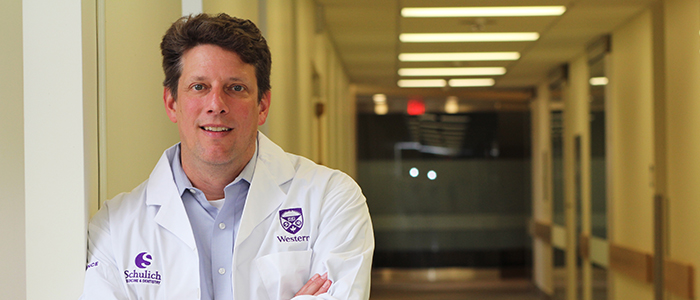Eric Arts joins global initiative to accelerate the search for HIV vaccine

According to the World Health Organization, approximately 35 million people were living with HIV at the end of 2013, and more than two million people are newly infected every year.
Schulich Medicine & Dentistry is the only Canadian site involved with the newly established European AIDS Vaccine Initiative (EAVI2020) that aims to accelerate the search for an effective HIV vaccine to help protect the millions of people who could be affected by the disease in coming years.
Financed by the European Commission, this C$33.2 million initiative will bring together leading HIV researchers from public organizations and biotech companies across the world in a focused effort to develop protective and therapeutic HIV vaccines.
Schulich Medicine & Dentistry is a key member of the EAVI2020 consortium, which will unite scientists from 22 institutions and pool their knowledge and expertise to develop novel candidate vaccines that can be taken through to human trials within five years.
Eric Arts, PhD, chair of the Department of Microbiology and Immunology, will lead Schulich Medicine & Dentistry’s contribution to the consortium.
“In order to achieve our goal and be successful in creating an effective HIV vaccine, we need to work as a team around the world,” Arts said. “Being a part of this team provides us with input, exchange and development of new technologies related to HIV and other infectious diseases.”
HIV is not a local disease — the majority of those affected are located in Sub-Saharan Africa. However, Arts, who was recently quoted in a Maclean's article on the search for an HIV vaccine, explained it is our obligation to better understand this disease to help protect the millions of people that could potentially be affected by it in the future.
“If we are going to save Africa from the worst modern pandemic in history, we all need to work together as a global team — we all need to contribute,” he said.
While funding from an EU-grant is not available to North American investigators, Western is providing significant support for Arts' participation in EAVI2020, because his leadership is considered critical for this global HIV vaccine initiative.
Recruited to Schulich Medicine & Dentistry in 2014, Arts and his research team have provided the international medical community with a better understanding of how strains of HIV mutate in different parts of the world, causing major differences in disease development and varying timelines in terms of progression to full-blown AIDS.
Arts will be contributing technologies and expertise throughout the initiative, and examining key factors describing the potential success of the vaccines developed.
His work and much more will be supported by a new $15-million research facility, currently under construction. Known as the Imaging Pathogens for Knowledge Translation (ImPaKT) facility, it will combine state-of-the-art imaging equipment, including positron emission tomography, magnetic resonance imaging and in vivo imaging systems, in a Containment Level II and III facility.
The ImPaKT facility will enable researchers to study some of the nastiest viruses and bacteria safely and effectively. “It’s an opportunity to look at infection and immunity in a whole new way. We have a great team in place, and I’m excited to bring in these tools and see what we can do with them,” said Rick Gibson, who is overseeing its development. He also hopes the unique facility will attract top researchers from across Canada and around the world.
There is an opportunity for the community to support the development of the ImPaKT facility. Click here to make a donation — please indicate "ImPaKT facility" in your response.








